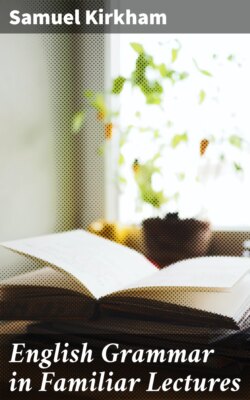Читать книгу English Grammar in Familiar Lectures - Samuel Kirkham - Страница 23
На сайте Литреса книга снята с продажи.
NOTES.
Оглавление1. When proper nouns have an article annexed to them, they are used after the manner of common nouns; as, "Bolivar is styled the Washington of South America."
2. Common nouns are sometimes used to signify individuals, when articles or pronouns are prefixed to them; as, "The boy is studious; That girl is discreet." In such instances, they are nearly equivalent to proper nouns.
3. Common nouns are sometimes subdivided into the following classes: Nouns of Multitude; as, The people, the parliament: Verbal or participial nouns; as, The beginning, reading, writing; and Abstract nouns, or the names of qualities abstracted from their substances; as, knowledge, virtue, goodness. Lest the student be led to blend the idea of abstract nouns with that of adjectives, both of which denote qualities, a farther illustration appears to be necessary, in order to mark the distinction between these two parts of speech. An abstract noun denotes a quality considered apart (that is, abstracted) from the substance or being to which it belongs; but an adjective denotes a quality joined (adjected) to the substance or being to which it belongs. Thus, whiteness and white both denote the same quality; but we speak of whiteness as a distinct object of thought, while we use the word white always in reference to the noun to which it belongs; as, white paper, white mouse.
4. Some authors have proceeded to still more minute divisions and sub-divisions of nouns; such, for example, as the following, which appear to be more complex than useful: Natural nouns, or names of things formed by nature; as, man, beast, water, air: 2. Artificial nouns, or names of things formed by art; as, book, vessel, house: 3. Personal nouns, or those which stand for human beings; as, man, woman, Edwin: 4. Neuter nouns, or those which denote things inanimate; as, book, field, mountain, Cincinnati. The following, however, is quite a rational division: Material nouns are the names of things formed of matter; as, stone, book: Immaterial nouns are the names of things having no substance; as, hope, immortality.
To nouns belong gender, person, number, and case.
